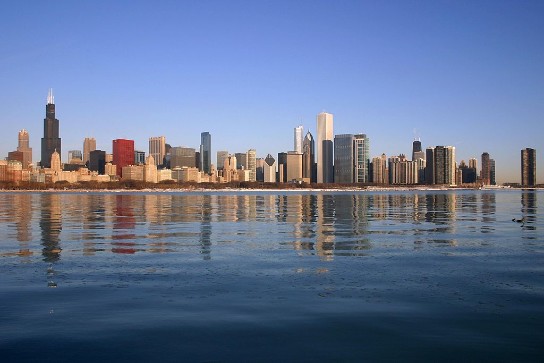
ASP in Chicago: Climate Change Threatens Security Across the Midwest
Podcast: Play in new window | Download
Subscribe: Apple Podcasts | RSS
On Tuesday and Wednesday, April 29 and 30, representatives of the American Security Project visited Chicago for a series of meetings, public events, and briefings on how climate change is affecting security, and how institutions in the region are planning for it. They partnered with the Chicago Council on Science & Technology (C2ST) to highlight the issue across the city.
Attending were BGen Stephen Cheney, USMC (ret.), ASP’s CEO and Brig. General Steven Anderson, USA (Retired). Cheney is the CEO of the American Security Project, and a 30 year veteran of the Marine Corps. Anderson is the Chief Marketing Officer of RELYANT LLC, a Service Disabled Veteran Owned Small Business based in Knoxville, Tennessee, that provides key construction, logistics, munitions response, and information services to our troops deployed overseas in the combat zone. Both are members of ASP’s Consensus for American Security. Andrew Holland, ASP’s Senior Fellow for Energy and Climate, and Porter Brockway, ASP’s events manager, rounded out the delegation.
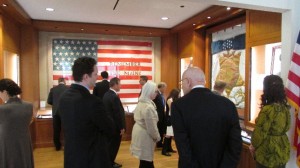 Pritzker Military Museum and Library
Pritzker Military Museum and Library
The first appointment was to meet with and tour the Pritzker Military Museum and Library on Michigan Avenue. ASP met with the leadership of the Pritzker library, including Kenneth Clarke, President & CEO, and toured their extensive collection of military memorabilia and their extensive library.
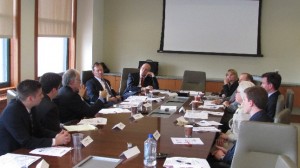 After the tour, ASP presented to a roundtable of veterans and national security experts about how climate change interacts with America’s security. Questions focused on how climate change would impact America’s military force posture and our ability to intervene around the world.Click below to listen to the full audio of the event.
After the tour, ASP presented to a roundtable of veterans and national security experts about how climate change interacts with America’s security. Questions focused on how climate change would impact America’s military force posture and our ability to intervene around the world.Click below to listen to the full audio of the event.
Chicago Tonight
After the meeting, General Cheney and Andrew Holland traveled to the studios of WTTW, Chicago’s public television station for an appearance on “Chicago Tonight” with Dr. Elisabeth Moyer, a climate scientist from the University of Chicago. They talked about the threats of climate change to national security with host Phil Ponce.
Launch of the Argonne Center on Climate Change and Security
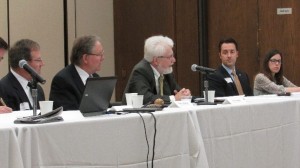 On Wednesday morning (4/30), ASP appeared with the Director of Argonne National Laboratory, Peter Littlewood, to discuss the creation of the Center for Integrated Resiliency Analyses, headed by John Hummel. This research center will be tasked with investigating how the changing global environment will affect our ability to respond properly to and mitigate damage from serious natural disasters and crises.
On Wednesday morning (4/30), ASP appeared with the Director of Argonne National Laboratory, Peter Littlewood, to discuss the creation of the Center for Integrated Resiliency Analyses, headed by John Hummel. This research center will be tasked with investigating how the changing global environment will affect our ability to respond properly to and mitigate damage from serious natural disasters and crises.
“The concept of national security has undergone very significant changes,” said John Hummel, director of the new center. “Now we recognize that national security can be impacted by economic factors and also environmental factors.”
The center is an effort to bring together Argonne’s environmental and energy expertise as well as computing power, to determine the most effective ways to respond to growing natural disasters.
An article in Medill, “New Argonne center brings together national security and climate change” quoted Holland saying “We don’t care about polar bears, we don’t care about tree frogs – we care about people,” and then going on to say “Climate change is a threat multiplier.” Argonne and the American Security Project have a shared vision of the future: they are hoping their efforts will bring about change in the preparedness of the nation.
Legislative and Scientist Roundtable Meetings at the University of Illinois at Chicago
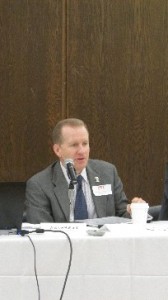 After the shared announcement, ASP presented to an assembled group of legislative representatives from across the region at the University of Illinois at Chicago. While some of ASP’s work discussed the global security impacts of climate change, much of the discussion focused on the very real impacts of climate change on Chicago and the broader Midwest region. Click below for audio.
After the shared announcement, ASP presented to an assembled group of legislative representatives from across the region at the University of Illinois at Chicago. While some of ASP’s work discussed the global security impacts of climate change, much of the discussion focused on the very real impacts of climate change on Chicago and the broader Midwest region. Click below for audio.
The next roundtable discussion, also taking place at the University of Illinois at Chicago, discussed the issue with a collected group of scientists. The focus of this discussion was on how global warming was having different impacts around the world and around the country, and how preparation was a key part of it.Click below for audio of the roundtable.
AUDIO OF THE LEGISLATIVE ROUNDATABLE
Luncheon with the Chicago Council on World Affairs
From there, the group traveled to a lunch organized by the Chicago Council on World Affairs. Organized by Rachel Bronson, the senior fellow for global energy at The Chicago Council on Global Affairs, the lunch featured energy and business leaders from across Chicago. The Council’s President, Ambassador Ivo Daalder, introduced the speakers. Discussion at the lunch focused on a range of issues, but looked especially at how energy and environmental policy interact with foreign and trade policy.
CsST Program: The Multipliaction of Threats: Climate Change & the Risks to National Security
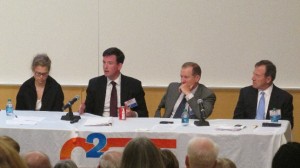 That evening, the main public event, titled The Multiplication of Threats: Climate Change & the Risks to National Security was held at the Hughes Auditorium of the Northwestern University Chicago Campus. Joined again by Dr. Elisabeth Moyer, co-director, Center for Robust Decision-making on Climate and Energy Policy (RDCEP) from the University of Chicago, the presenters discussed the importance of risk analysis and risk management when talking about climate change.
That evening, the main public event, titled The Multiplication of Threats: Climate Change & the Risks to National Security was held at the Hughes Auditorium of the Northwestern University Chicago Campus. Joined again by Dr. Elisabeth Moyer, co-director, Center for Robust Decision-making on Climate and Energy Policy (RDCEP) from the University of Chicago, the presenters discussed the importance of risk analysis and risk management when talking about climate change.
The full two days were important because it underscored both the threats that climate change pose to national security and to cities like Chicago and the opportunities that businesses, students, and the government have in preparing for a changing world. As this tour showed, serious institutions like Argonne National Laboratory are studying and preparing for climate change. The remarkable consensus by those participating in the events showed how important climate change is to people around the Midwest, Importantly, those who present climate change as only a cost are presenting a false choice – and no one knows that better than the military. We can increase mission effectiveness and reduce the footprint at the same time: Chicago can help lead the way.






[…] National Laboratory, which ASP partnered with in April to launch a new center on climate change and security, has responded to this challenge by […]
[…] ASP in Chicago: Climate Change Threatens Security Across the Midwest Andrew Holland […]